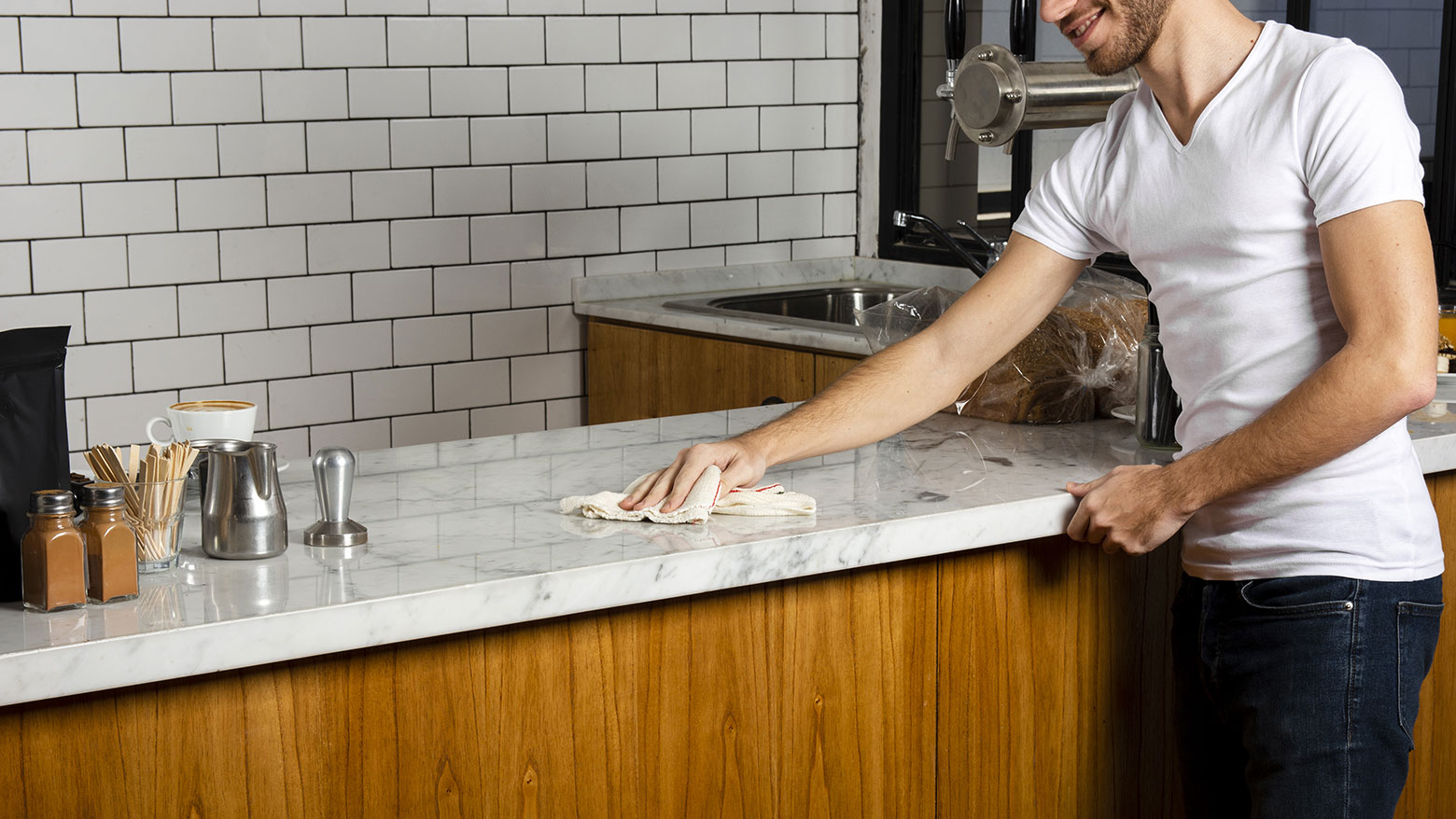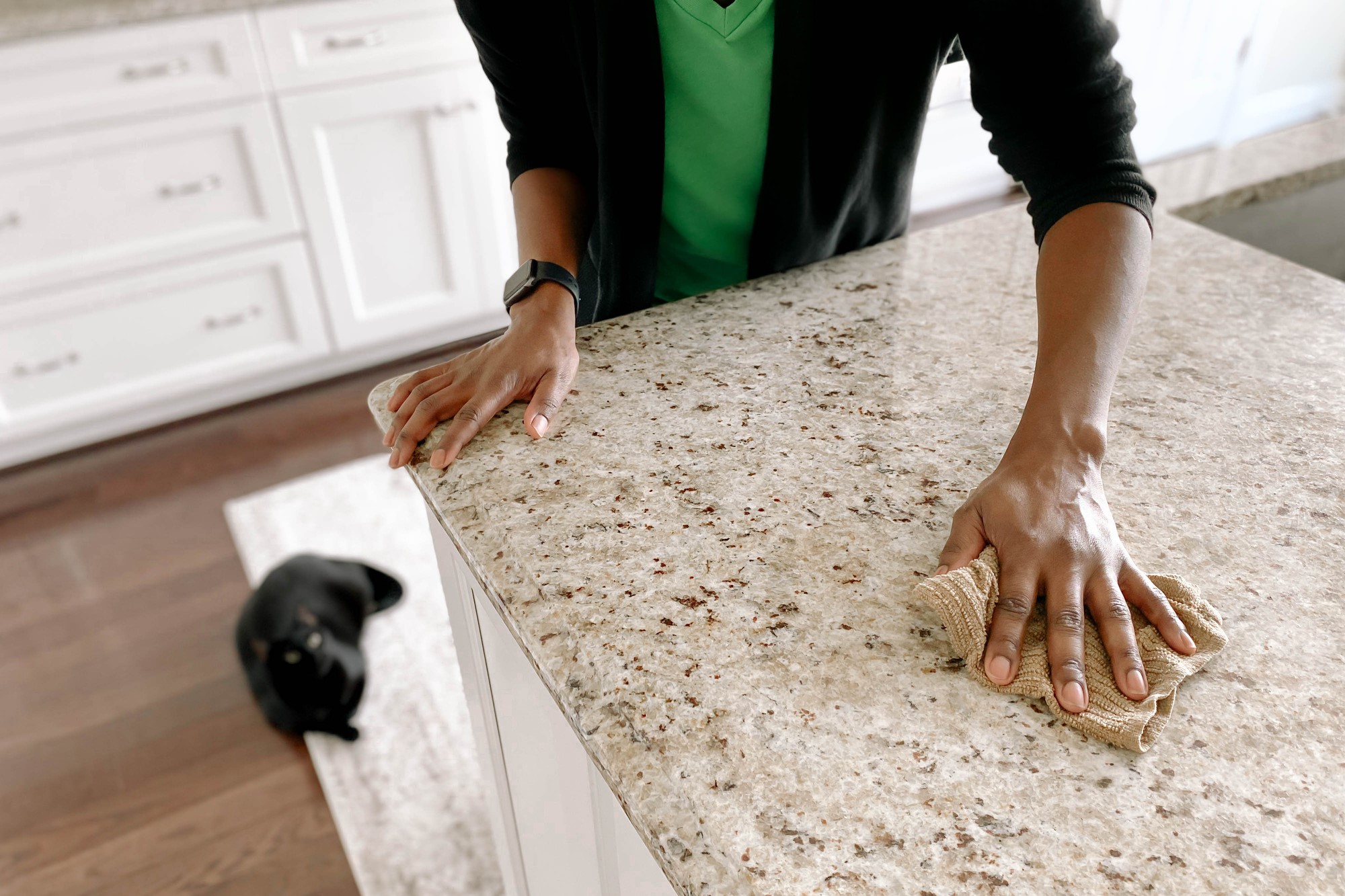Granite countertops cleaning emerges as a topic of utmost importance, offering a roadmap to preserving the beauty and functionality of these elegant surfaces. Delve into this comprehensive guide to discover expert insights, practical tips, and solutions for all your granite countertop care needs.
Unveiling the secrets to daily and weekly cleaning routines, this guide empowers you to keep your granite countertops sparkling and pristine. Explore the nuances of selecting the right cleaning solutions and tools, ensuring the longevity and aesthetic appeal of your investment.
Granite Countertops Cleaning Basics

Granite countertops are a popular choice for kitchens and bathrooms due to their durability and beauty. However, they require regular cleaning to maintain their appearance and prevent stains. Daily and weekly cleaning routines are essential to keep granite countertops looking their best.
There are a few different types of cleaning solutions that can be used on granite countertops. Mild dish soap and water is a good option for everyday cleaning. For tougher stains, you can use a granite cleaner specifically designed for the material.
Avoid using harsh chemicals or abrasive cleaners, as these can damage the granite.
When cleaning granite countertops, it is important to use a soft cloth or sponge. Avoid using abrasive materials, such as steel wool or scouring pads, as these can scratch the surface of the granite.
Dealing with Stains and Spills
Granite countertops are generally stain-resistant, but spills and stains can occur. It’s important to address these promptly to prevent permanent damage.
-
Identifying Common Stains
Granite is a porous material, making it susceptible to staining from various substances. Common types of stains include:
- Food stains (e.g., coffee, wine, tomato sauce)
- Oil stains (e.g., cooking oil, butter)
- Ink stains (e.g., pens, markers)
- Rust stains (e.g., metal objects)
- Hard water stains (e.g., calcium deposits)
-
Removing Food Stains
Most food stains can be removed with a damp cloth and a mild dishwashing detergent. For stubborn stains, apply a paste of baking soda and water, let it sit for a few minutes, and then wipe clean.
-
Removing Oil Stains
Oil stains can be more challenging to remove. Try using a commercial granite cleaner specifically designed for oil stains. Alternatively, you can apply a poultice made from baking soda and water, cover it with plastic wrap, and let it sit overnight.
-
Removing Ink Stains
Ink stains can be removed using rubbing alcohol or nail polish remover. Test a small area first to ensure it doesn’t damage the granite.
-
Removing Rust Stains
Rust stains can be removed using a commercial rust remover. Follow the manufacturer’s instructions carefully.
-
Removing Hard Water Stains, Granite countertops cleaning
Hard water stains can be removed using a vinegar solution. Apply the solution to the stain, let it sit for a few minutes, and then wipe clean.
Polishing and Sealing Granite Countertops: Granite Countertops Cleaning

Polishing and sealing granite countertops enhances their appearance, durability, and longevity. Polishing brings out the natural luster of granite, while sealing protects it from stains, spills, and wear and tear.
Polishing Granite Countertops
To polish granite countertops, use a polishing pad attached to a variable-speed polisher. Start with a coarse pad and gradually move to finer pads. Apply a small amount of polishing compound to the pad and work in circular motions. Use light pressure and avoid overheating the granite.
Sealing Granite Countertops
To seal granite countertops, apply a penetrating sealer specifically designed for natural stone. Follow the manufacturer’s instructions for application and curing time. Reapply the sealer every 6-12 months or as needed to maintain protection.
Frequency of Polishing and Sealing
The frequency of polishing and sealing depends on the usage and wear of the countertops. For heavily used countertops, polish and seal them every 3-6 months. For less frequently used countertops, annual polishing and sealing may suffice.
Troubleshooting Common Issues
Granite countertops, despite their durability, can encounter certain problems over time. Identifying and addressing these issues promptly helps maintain their pristine condition.
Etching
Etching occurs when acidic substances, such as lemon juice or vinegar, come into contact with granite, leaving dull spots. To prevent etching, use coasters or cutting boards and wipe up spills immediately. For minor etching, apply a baking soda paste and leave it on for 15 minutes before wiping it away.
Scratches
Fine scratches can be removed using a granite polishing compound. Apply the compound to a soft cloth and rub in circular motions. For deeper scratches, professional repair may be necessary.
Discoloration
Discoloration can occur due to exposure to sunlight, heat, or chemicals. To prevent discoloration, use UV-resistant sealants and avoid placing hot pots or pans directly on the countertop. For minor discoloration, try cleaning with a granite cleaner. For severe discoloration, professional restoration may be required.
Professional Repair or Restoration
For significant damage, such as deep scratches, chips, or cracks, professional repair or restoration is essential. Skilled technicians can restore the countertop to its original condition, ensuring its longevity and aesthetic appeal.
Final Thoughts
As you embark on the journey of granite countertops cleaning, remember the importance of regular maintenance, prompt stain removal, and professional repair when necessary. By following the guidance Artikeld in this comprehensive guide, you can preserve the timeless beauty of your granite countertops, ensuring they remain a stunning focal point in your home for years to come.
